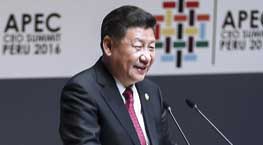BEIJING, Dec. 1 (Xinhua) -- The benchmark overnight Shanghai Interbank Offered Rate (Shibor), a measure of the cost at which Chinese banks lend to one another and a key barometer of liquidity, rose for the 16th straight day on Thursday.
On Thursday's interbank market, Shibor edged up 0.9 basis points to 2.325 percent. The Shibor for seven-day loans increased 0.6 basis points to 2.502 percent, a new 15-month high. The Shibor for three-month loans rose 1.98 basis points to 3.0556 percent, up for the 31st straight day.
The current cash-strapped condition in China's interbank market is mostly the result of drops in new yuan funds outstanding for foreign exchange since October, said Liu Dongliang, analyst at China Merchants Bank.
New yuan funds outstanding for foreign exchange refers to the amount of yuan Chinese banks put into the domestic market when they acquire foreign currencies from individuals or companies. It is an important indicator of foreign capital flow in and out of China as well as domestic yuan liquidity.
New yuan funds outstanding for foreign exchange fell 267.9 billion yuan (39.2 billion U.S. dollars) in October to 22.6 trillion yuan, marking the 12th consecutive month of declines, according to the central bank.
Meanwhile, moves by the central bank to defend a weaker yuan have sucked funds from the banking system, pushing up domestic borrowing costs, said Liu.
On Tuesday, China's central bank drained 10 billion yuan from the market, marking the fourth consecutive day that the central bank has drained liquidity from the market.
On Wednesday and Thursday, the central bank pumped 90 billion yuan and 5 billion yuan, respectively, to ease the liquidity strain.
Nevertheless, Liu said liquidity is expected to remain tight in the near term, as China will continue to keep a prudent monetary policy.










